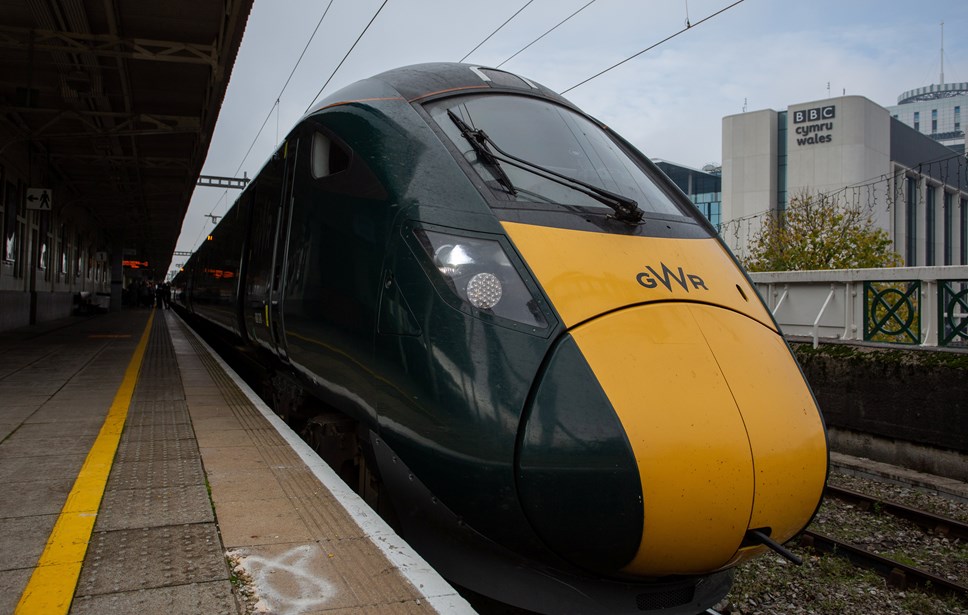
GWR launches new timetable in South Wales with changes to 75% of all trains
The new December weekday train timetable for South Wales has been launched today, providing faster journey times, more seats and more frequent services to key locations. Users are being warned to check before travelling to avoid being caught out.
Regular travellers have been asked to check their new journey times for the biggest timetable change on the network since 1976. GWR’s Intercity Express Trains (IETs) are taking advantage of infrastructure improvements to run to a fully-electric timetable between Cardiff and London for the first time.
The planned improvements are so significant, especially for those who travel regularly and are used to catching a particular service every day, that GWR launched an awareness campaign to highlight the changes, and make sure customers are prepared, encouraging customers to find out more at www.gwr.com/timetable2019 before they head to their local station.
The new timetable unlocks the full potential of the IETs modern technology and improved acceleration, allowing typical journey times on the company’s popular twice-hourly Cardiff to London service to be shortened by 14 minutes to just 1 hour 53 minutes. The fastest journeys from Paddington to Swansea will be shortened by 17 minutes to 2h38.
A new, super-fast third hourly service will run at the busiest times of day, running non-stop between Bristol Parkway and Paddington and allowing customers to travel from capital to capital as quickly as 1 hour 42 minutes – 17 minutes faster than is possible today. These will run in the morning and evening peaks from December.
There are also more improvements for customers travelling between Cardiff and Bristol, as GWR continues to roll out five-carriage Turbo trains to replace the current three-carriage Class 150 units on the Cardiff-Portsmouth route.
Emeritus Professor of Transport (Economics and Policy), University of South Wales, Stuart Cole CBE, said:
“This is great news for the economy of South Wales and for cross-border rail customers. These new trains will be a great support for visitors and commuters alike and there is more to come as work is completed on electrification to Newport and Cardiff.”
The additional services, coupled with the additional seats provided by the IETs, give customers travelling on the South Wales-London corridor 15,000 extra seats every weekday from May 2020.
GWR Managing Director Mark Hopwood said:
“This timetable has been a number of years in the making, enabling us to deliver the benefits of new Intercity Express Trains, and modernised infrastructure, for our customers. With the changes we realise that investment in trains and infrastructure, and deliver on the promise we made to customers for more services, more seats and faster journeys.
“More than 350 extra on-board staff have been taken on, more than 1,200 drivers trained, and we will have extra staff at stations throughout our network to help as we embark on this new journey.
“We have worked hard to help people understand how the changes will affect them. We have spoken with our customers as often as possible, possibly annoyingly so, to help ensure a smooth transition, but we all recognise there will be some issues to iron out as everyone gets used to the changes.”
Those travelling on GWR services between Cardiff, Bristol and the West can also expect Castle Class trains running at the busiest times of day on the route – modernised high-speed trains with four carriages, and automatic closing doors. These trains will help to increase seat numbers on the line by more than 1,800 every weekday.
Network Rail Route Managing Director for Wales and Western, Mike Gallop, said:
“The timetable change this December will be the biggest since 1976 and will mean faster journeys and more frequent services for passengers.
“It follows unprecedented investment in railway infrastructure including electrification, improved signalling, upgraded stations and much more, which together with the introduction of new trains will transform rail travel.”
In the run-up to the timetable change GWR has sent six million emails to customers; put up hundreds of posters at sites across its network, both at stations and in the community; has run 60 meet-the-manager sessions at stations; has met with transport leaders across the network; and secured hours of airtime across the local media to raise awareness.
